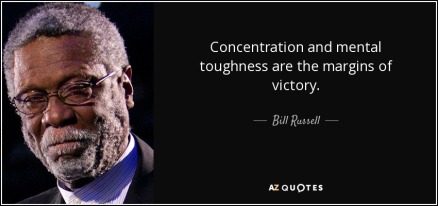 Mental toughness is defined as the ability for athletes to resist, manage and overcome doubts, worries or circumstances that may prevent the athlete from excelling at a specific task set out to achieve. Acquiring the mental skill, will allow athletes to have a “psychological edge” that enables them to cope better than their opponents with the demands sport places on the athlete. Sport is more than just the physical aspect, but a main factor in sport is being in control of your mind as well as the emotions involved.
Mental toughness is defined as the ability for athletes to resist, manage and overcome doubts, worries or circumstances that may prevent the athlete from excelling at a specific task set out to achieve. Acquiring the mental skill, will allow athletes to have a “psychological edge” that enables them to cope better than their opponents with the demands sport places on the athlete. Sport is more than just the physical aspect, but a main factor in sport is being in control of your mind as well as the emotions involved.
With young children, parents and coaches have a large role to play when it comes to developing the child’s healthy philosophy when pertaining to sport. Parents and coaches help foster the definition of what it means to achieve or how to deal with setbacks when they occur. As young athletes start developing a sense of self-awareness, they are able to engage in creating their own definitions of what it means to “win” and “lose” within a sport and how to overcome these obstacles.
Mental toughness is a skill and it is not something you are born with; rather, needs to be learned and worked on throughout one’s sporting career, beginning with the youth levels in sport. As a parent or a coach, what you say to an athlete before and/or after a competition or practice is crucial to either develop or severely impede a child’s mental toughness and resilience levels. What is said to a child at these young ages will be very important as that young athlete learns how to develop with failure and criticism as well as succeeding and accomplishing their individual goals.
There are a number of ways to develop a child’s mental toughness whether you are a parent or a coach, including:
Athletes are not afraid to fail
- Poor performances are usually associated with messing up or failing; instead use failure as a positive outlet, a source of motivation and feedback to improve
- John Wooden, former legendary UCLA basketball coach states that, “mistakes are the stepping stones to achievement” – if you never fail or make mistakes, how are you going to learn?
- F.A.I.L – First Attempt In Learning
- Mistakes are just learning opportunities that are able to enhance our performance – we are given the ability to adjust and improve
Separate the athlete’s self-worth from their performance
- Self-worth: the sense of one’s own value as a person
- Self-worth is NOT equated to performance
- Parents – should not use tactics such as embarrassment, threats, guilt, punishment, emotional withdraw from your children to motivate them to perform at a standard that is acceptable for you
- Don’t show that winning is the only thing that will make them “good enough” for your love and support
- Punishment builds a fear of failure
- As long as the young athlete tried their best, they are just as important whether they win or lose
The athlete themselves are their biggest competitors
- Teach young athletes that competitive situations are self-challenges rather than threats (ex. The opposing team)
- If the athlete loses the game or event, due to the focus on “beating” a certain competitor, or “winning” the game, this may lead to a stifled performance mentality
- Focus is on development at this age and having fun – instead of an external competitor, focus on “improving yourself and doing your best” – improving your free throw, technique, etc.
Promote healthy competition by teaching the athlete to like and respect the sport opponents
- Motivation does not come from hatred or anger towards the opponent – rather competition exists only because there is an opponent
- Encourage sportsmanship not only to the opponent, but to the officials, spectators, and coaches
Sport is something you LOVE! The athlete is enjoying themselves
- Sports are fun whether you win or lose – main goal is to have fun!
- Children who love what they are doing tend to perform better and are more eager to step outside of their comfort zone to try new things
- At this age, sport does not need to be as serious as the professional leagues – may result in burnout for young children
Conclusion
When it comes to mental toughness, athletes must be able to start developing this skill from a very young age. Throughout every sport, it is important to recognize that competition does not just occur from the physical point of view, but mental toughness has a major role to play as well. Developing mental toughness does not just occur in one day; rather, across the lifespan and is a very difficult skill to master. However, if a young athlete is able to have a strong support system who fosters and promotes a positive attitude towards sport, it will put them on a great path to achieving their goals.

For more information on this topic follow:
Feel free to let me know what you think? Leave your comments, thoughts and opinions in the section below.

Source: The SNYB Blog http://ift.tt/2o61tI1

